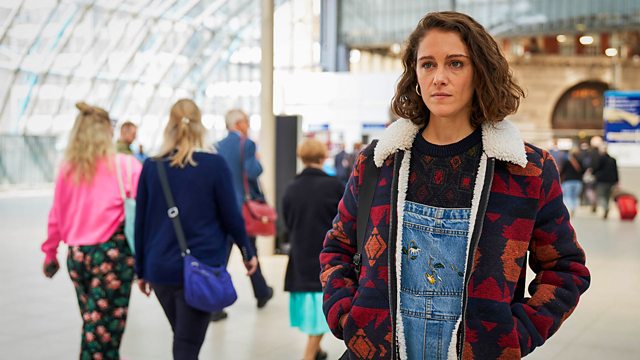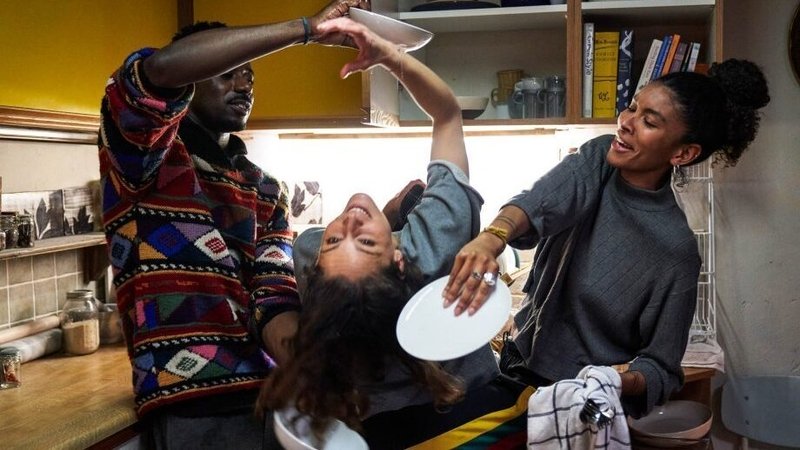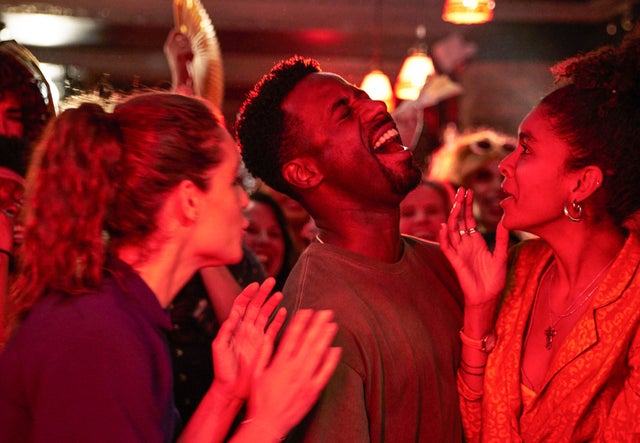By So Mayer
TRIGONOMETRY is broadcast on Sunday evenings on BBC2, starting with eps 1&2 Sun 15 March. All 8 episodes are available now on iPlayer, for a year.

Two of our favourite femmes, ATTENBERG director Athina Rachel Tsangari and actor Ariane Labed, have rejoined forces for a beautiful queer love story! The BBC may have dropped the series into the schedule with zero fanfare, but here at Culture Club we are singing its praises across the rooftops, like a virtual version of Italy’s solidarity singers. TRIGONOMETRY co-writers Effie Woods (Priya Sharma #1 from Corrie) and Duncan Macmillan(best known for the play People, Places and Things starring Denise Gough) have not only created an absorbing, gorgeous drama but they also drop in plenty of queer intertexts; Gemma wanting to be “shot into space” ticks the Carol square on my queer bingo card.
Also everyone rocks dungarees and boiler suits.
Attenberg fans will bliss out the nature documentary and dorky dancing jokes in episode one. Like Tsangari’s first feature, TRIGONOMETRY is a story about how we live together in the crisis of capitalism and when bodies are vulnerable, tender and beloved. It shares its handheld style and overlapping dialogue (and intense feels) with the Before trilogy by Richard Linklater, who mentored Tsangari (she co-produced Before Midnight). Over eight lush episodes, the series tells the story of a thruple that forms initially under the pressures of high rent, austerity, work, and injury – and also through the ways that contemporary urban life brings us unexpectedly into each other’s orbits. Plus there’s some drag wisdom and a light-up unicorn pen.

Labed plays Ray, a 30 year old Olympian synchronised swimmer, or rather recently ex-, who moves out of her parents’ suburban home and away from her BFF Moira (Isabella Laughland) for the first time after an accident that leads her to quit the pool, and into Gemma (Thalissa Teixeira) and Kieran’s (Gary Carr) flat, above the cafe Gemma is trying to get off the ground. Kieran, a paramedic, is on nightshifts with his chatty co-worker Chris (Aymen Hamdouchi), and has a tendency toward heroic rescues that leave him bruised. Gemma, a self-described “angry brown queer girl” was disowned by her white father after her mother’s death until she got together with Kieran, who grew up in the foster care system with his sister Dee (Ann Akin). Their relationship is both trusting and frustrated, by the exigencies of work and money, and – in the background – by Gemma’s queerness and by their differing views on marriage.
Into these tensions and desires arrives Ray: a ray of light, lancing the aspects of themselves they might have been trying to keep hidden even as she realises what she has been missing of the world while she has been underwater. At the same time, the show doesn’t make light of her synchronised swimming skills: she knows how to be responsible to a team, she knows how to work hard and keep breathing, and she also knows how to get (most) persistent glitter off skin after a night out at Gemma’s friend Jason’s (Hugh Wyld) drag show. In episode 2 (full disclosure: I’m *not* bingeing because the show is paced like life and I want to enjoy it that way… although the leads’ collective chemistry makes it hard to take things slow), the persistence of glitter becomes a scintillating queer trace of intimacy and infectiousness, of how hard it is not to be marked by others’ closeness and to wear that closeness of community on our skins, of how we cross the line consensually into touch.
As Alison & Rosie, reviews editors at MAP magazine, write today in introducing their first issue, “Staying Close”:
Now, in these uncertain times of closure, cancellation and isolation (waiting, hands washed and on our own) ‘contact’ finds itself up front in our minds—the consideration of its meaning and its possibility all the more vital… MAP is a location, a host, a point of contact and convergence. A point around which to encircle. We start from a place we know well. Or think we do.
Gemma’s cafe is called The Ampersand, the punctuation mark & that joins things together. OK, it’s not subtle but it’s beautiful: a sign that even as the show considers the strengthening of an intimate sexual and romantic relationship, it will not let the world fall away. Gemma is also Chef, teaching her young staff to handmake pasta and run a kitchen; like Kieran, she’s part of a bigger world that is at once a job and a vocation, a way to survive and a passion for relating to others, a way of making family when your birth family doesn’t or can’t give you what you need. The show could have been called CHOREOGRAPHY as much as TRIGONOMETRY for the intricate and interwoven shapes the characters’ lives make, and make with the city and the spaces they move through. The locations may map a somewhat dreamy London where Hammersmith Bridge and the Regents Canal are cheek-by-jowl, but somedays – especially right now – that closeness may be how we wish it could feel, for reasons other than gentrification flattening everything.

A show about a poly queer relationship could have been “and… and… and,” capitalistically acquisitive and selfish, and/or just focused on the relationship drama. Instead TRIGONOMETRY works all the angles while changing up the a 180° degree rule to triangulate the gaze queerly (I’ve been holding the math jokes in for five paragraphs now), using an expansion of the romantic dyad to think about how we can all challenge our ideas of who we regard, who we connect to, and how. Matching bruises, hospital backpacks, FaceTiming your bellybutton, nearly drowning, sudden labour pains: accidents and emergencies always surround us and bring us together. TRIGONOMETRY reminds me that that can be painful because it is both necessary and beautiful.
